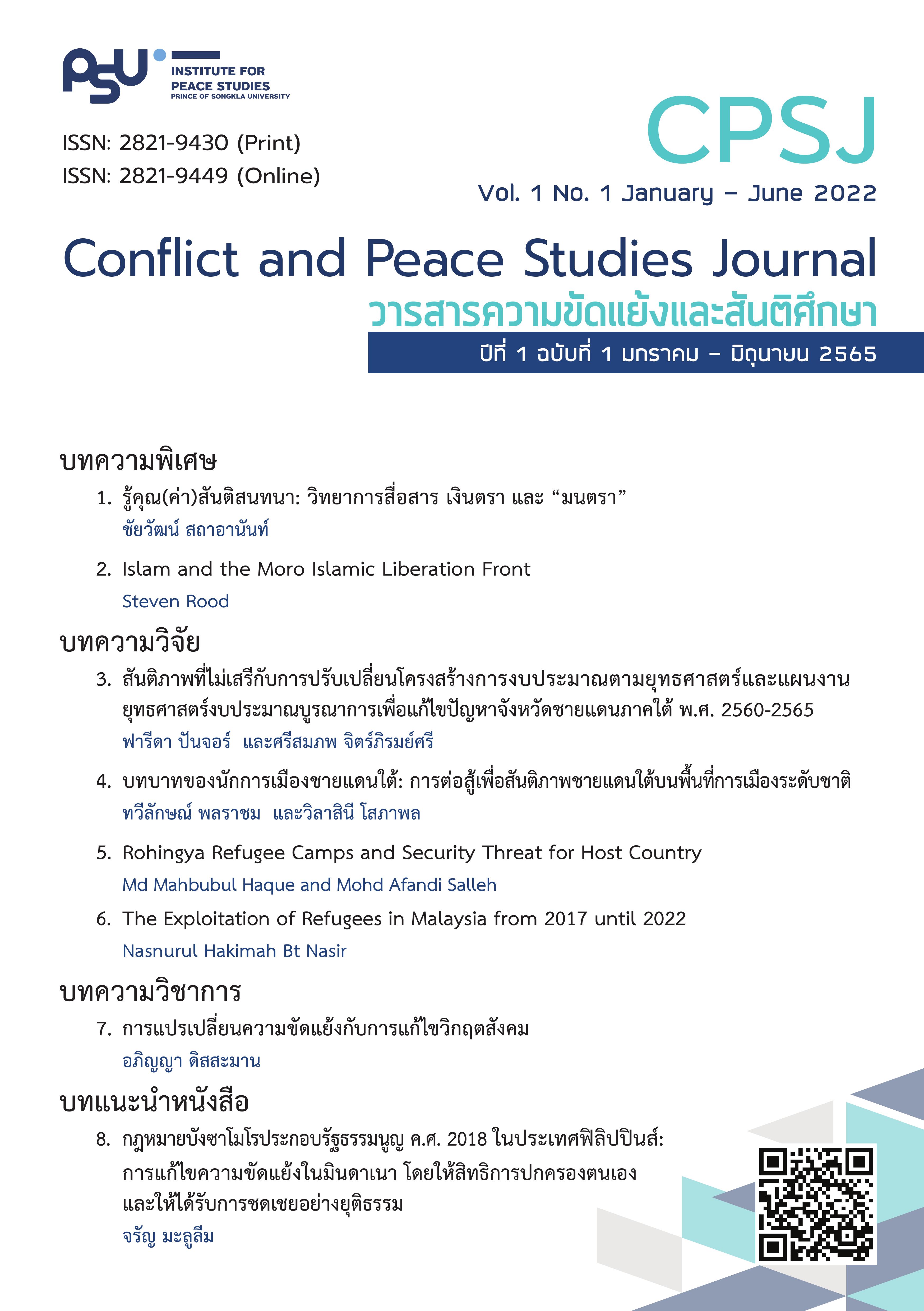Conflict Transformation and Social Crisis Resolution
Main Article Content
Abstract
This article aims to explore the concept of conflict transformation which was initially developed in the 1990s to serve conflict resolutions. Since the concept of conflict resolutions emphasizes on a large-scale and protracted conflict, a peace process is mobilized among all of the stakeholders in the dynamic of the conflict to involve them in the process of conflict resolutions based on the social structure and culture. Most chronic conflicts have never been scrutinized to find the root causes by those in charge. Some conflicts are disguised and become the culture where most people in society get used to the cycle. The concept of conflict transformation in each society includes sustainable peace and coexistence, so the process is to serve coexistence according to people’s interactions and relationship in society. Diversity in all dimensions is to be accepted in society to sustain the coexistence while other developments of relationship are in progress. Alternative approaches can also be implemented to create constructive collaboration for the better future of society. This article offers analytical perspectives to reflect the challenges and obstacles in conflict transformation. A profound understanding about conflict management will lead to a value of thinking to be rooted in society. How to exercise the rights and liberty, the state of inequality and equality, and other controversial issues in society are academically analyzed through the local and international case studies on conflict transformation to reach a broader understanding of the peace process.
Article Details
References
Abu-Nimer, M. (eds.). (2001). Reconciliation, Justice, and Coexistence: Theory and Practice. Lanham, MD: Lexington Books.
Apornsuwan, T. (2012). The research of Asymmetry of power in society. Bangkok : Truth and Reconciliation Committee.
Aue-amnuy, J. (2002). New Paradigm of Justice System: from Revenge to Reconciliation. the document from Restorative justice: new choice for justice system of Thailand.
Augsburger, D. (1992). Conflict Mediation Across Cultures. Kentucky: Westminster/John Knox Press.
Azar, E. E. (1990). The Management of Protracted Social Conflict: Theory and Cases. Hampshire: Dartmouth Publishing.
Bloomfield, D., & Reilly, B. (1998). The Changing Nature of Conflict and Conflict Management. Stockholm: Institute for Democracy and Electoral Assistance (IDEA).
Curle, A. (1971). Making Peace. London, England. Tavistock.
Galtung, J. (1998). Peace by Peaceful Means: Peace and Conflict, Development and Civilization. London: Sage Publications.
Khannenje, H. (2007). Between Johannesburg and Jerusalem: A comparative Analysis of Non-Violence As A Strategy For Political Change; The Case of Apartheid South Africa and the Occupied Territories of Palestine/Islael. A thesis Submitted to the McAnulty College and Graduate School of Liberal Arts, Duquesne University.
Lederach, J. P. (1995). Conflict Transformation in Protracted Internal Conflicts: The Case for a Comprehensive Network. In Kumar Rupesinghe, ed., Conflict Transformation. New York: St. Martin's Press.
Miall, H. (2004). Conflict Transformation: A Multi-Dimensional Task, in: Berghof Handbook for Conflict Transformation, Online Version.
Miall, H. Ramsbotham, O., & Tom, W. (eds.). (2011). Contemporary Conflict Resolution. 3rd Edition. Cambridge: Polity.
Moore, C. W. (1996). The Mediation Process: Practical Strategies for Resolving Conflict; 2nd edition, pp. 60-61.
Ralf Dahrendorf, Class and Class Conflict in Industrial Society. (Stanford, Calif. : Stanford University Press, 1959). Berghof Handbook for Conflict Transformation, Online Version, www.berghof-handbook.net
Vatthanasapt, V. (2004). Conflict Management: Principle and Tools of Conflict Resolution. Nonthaburi: King Prajadhipok’s Institute.
Väyrynen, R. (1999). From Conflict Resolution to Conflict Transformation: A Critical View. In Ho-Won Jeong, ed., The New Agenda for Peace Research. Brookfield: Ashgate Publishing.

